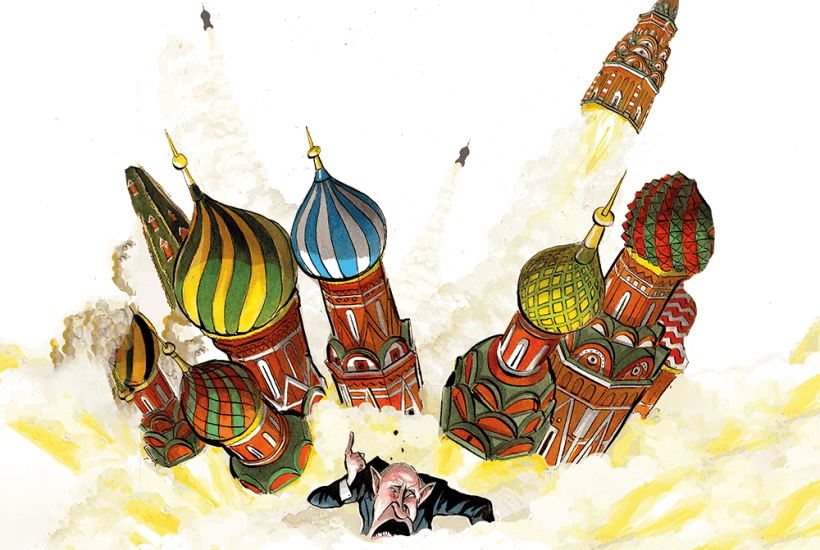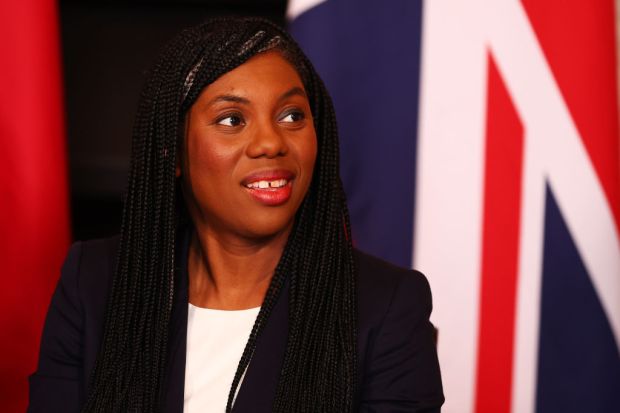Seeing Vladimir Putin’s bloated face and listening to his increasingly unhinged rhetoric makes it tempting to assume that the current conflict in Ukraine is all about him. His actions and threats take Europe back not just to the 1930s, or even to the 1860s and Bismarck’s cold-blooded ‘cabinet wars’, but to the 1740s when Frederick the Great blatantly grabbed Silesia and set Europe ablaze. In attacking a peaceful sovereign country, Putin has regressed long before the United Nations Charter, and even before 1815, when the war-weary states that defeated Napoleon created a ‘Concert of Europe’ to keep the peace – with tsarist Russia one of the guarantors.
Quite mild-mannered people now express the hope that Putin might be ‘taken out’, and our problems thereby solved. Perhaps. But the real problem may be Russia itself. I don’t mean with its people. I’m not suggesting that there is some dark national psyche. Rather, Russia as a political and geographical entity, an unstable mixture of strength and weakness.
Because of its size and population, Russia has been scaring its neighbours for centuries. But because of its vast distances and backwardness compared with the West – a relative backwardness that remains constant – its autocratic rulers are perpetually fearful of their vulnerability and obsessed by prestige. The result is threatening talk and frequent aggression towards bordering states. Their vulnerability is political – the subversive attractions of western liberalism – at least as much as military, as you have to be as crazy as Napoleon or Hitler to invade those vast expanses.
The aggressiveness is a matter of record. All powerful states sometimes use force. Britain and America are hardly shrinking violets. Nevertheless, Russia’s history of more than three centuries of conflict on its frontiers is striking. Against Sweden and Turkey in the 18th and 19th centuries. Against Poland repeatedly for over 300 years. Against Germany – admittedly, at least as much to blame. Within living memory against Finland, Hungary, Czechoslovakia, Afghanistan, Georgia, Chechnya, Syria and now of course Ukraine.
One key to this is the uncertainty about how strong or how weak Russia really is – uncertainty among its own rulers as well as among its neighbours. Russia’s strength, in appearance immense, has repeatedly collapsed when seriously tested. This is the pattern of the last two centuries.
Russian armies reached Paris in 1814 – their furthest ever advance. The world was impressed by the new giant. But what followed was a saga of over-confidence. Russia took on France and Britain in the Crimea in 1853 and lost: huge numbers were no use, as some troops did not even manage to reach the front before the war ended. Humiliation by the Japanese followed 50 years later. In 1914, the ‘Russian steamroller’ was supposed to crush all before it, but it was stopped by the Germans within weeks. The Poles thrashed the Communists in 1920, and the Finns almost did so in 1940. We have grown up with the legend of the invincible Red Army crushing the Wehrmacht. But it depended on Britain and America, who kept it supplied and forced the Germans to commit the vast bulk of their resources in the West.
The same problems recur: distance, failing logistics, technological backwardness, terrible casualties and poor motivation resulting from a brutal military system serving harsh autocratic regimes. So war brought the threat of revolution – in the 1820s, 1850s, 1905, 1917, 1989. And 2022?
Yet hopes of freedom were ruthlessly crushed. This is the other key to the Russian problem, both for its neighbours and for itself: inability to create a liberal democracy. Russia has for centuries had a culturally sophisticated elite, many of them adopting Western manners. But the elite was small, and had a lot to lose: the gulf between rich and poor in Russia has always been vast, even under Communism, when nominal equality masked immense privilege. Russia’s autocrats have repeatedly turned the masses against liberals, accused of excessive fondness for foreign countries. So cultivated Russians were scared both of their rulers and of their inferiors, who were serfs until 1861, and never really free until the 1980s. Russia, went the argument, was different: so big and so diverse it needed dictatorship.
Dictatorship, in the final analysis, is what makes Russia dangerous to its neighbours and to itself. Only dictatorship can scrape up an outsized military budget from a relatively impoverished country, as it has done for centuries. ‘Upper Volta with rockets’ was the joke about the USSR. Only a truly democratic Russia can be a good neighbour, and it is our vital interest – as during the Soviet era – to support Russian democrats (no longer a small elite), and reassure all Russians that we wish them well. Putin wants to turn Ukraine into Russia. The world needs Russia to turn into Ukraine.
Got something to add? Join the discussion and comment below.
Get 10 issues for just $10
Subscribe to The Spectator Australia today for the next 10 magazine issues, plus full online access, for just $10.



















Comments
Don't miss out
Join the conversation with other Spectator Australia readers. Subscribe to leave a comment.
SUBSCRIBEAlready a subscriber? Log in